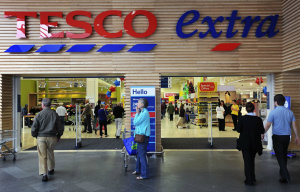Too good to be true?

Retailers are working harder than ever to ensure their value perception can stand up to scrutiny. However displaying incorrect pricing can throw a serious spanner in the works, as Patricia McDonagh reports
15 October 2013

It is something that should have faded to dust when the Celtic Tiger stopped roaring.
But unfortunately, the moniker of rip off Ireland hasn’t entirely disappeared from our shores – with a worrying trend of misleading product pricing by Irish retailers tightening its grip on the country.
Damaging a store’s value perception
Undoubtedly, many retailers and their symbol groups have been working hard to ensure that they are offering their customers a range of promotions and competitive pricing across all categories. However, if customers are charged a different price at the till from the one advertised on the shelf, this can have a damaging impact on a store’s value perception.
Consumers are protected from misleading pricing – which happens when a trader charges a higher price than was indicated on the product- under Section 43 of the Consumer Protection Act 2007.

Consumers Association of Ireland CEO Dermott Jewel believes a store’s “quality control should be robust enough to deal with mispricing”
NCA issues compliance notices
But in August the National Consumer Agency (NCA) revealed that 18 supermarkets – including supermarket giants Tesco, Dunnes and SuperValu had charged more for goods than the price displayed.
Of the 18 stores, 10 were in Dublin while there was one each in Meath, Westmeath, Louth, Clare, Galway, Wicklow, Wexford and Sligo, according to the NCA’s Consumer Protection List.
The retailers were issued with compliance notices by the NCA – an enforcement action which forces the trader to correct any misleading pricing breaches in the store.
For Dermot Jewell, CEO of the Consumers Association of Ireland, such statistics are a worrying challenge for already recession weary consumers.
A worrying occurence
"The fact that this is happening at all is very worrying. I am concerned that this problem exists at all and more so because it is becoming more prevalent. We rarely hear of the opposite happening – why is it that prices are always increased by retailers and never decreased mistakenly?" he said.
"Many customers only realise they have been overcharged when they go home and check their receipt. Some customers get a refund and an apology whereas others are greeted with distain and are given a refund grudgingly. It is really up to the company policy. The latter shouldn’t trickle down. An element of training is required."
Jewell believes that the problem is escalating because of poor store quality control and a lack of resources to clamp down on this problem.
Weak excuses
"Stores must have an internal system of tracking and updating prices to stop this problem from occurring. Staff also need to be trained effectively. It confuses me that this is not already being done – how can a store not know they are overcharging customers? Something is missing. We still don’t know what is happening," he said.
"I acknowledge that it is difficult to be in business during a recession, but that is no excuse to have an incorrect value on goods. The current excuses offered seem weak. Any element of quality control should be robust enough to deal with mispricing.
"Enforcement is only as good as the frequency at which it is implemented. It is well understood by retailers that such checks are random and therefore there is an opportunity for retailers to continue this practice," he added.
"Instead of going away, this problem seems to be escalating. We are getting more and more calls from customers who have met with arrogance and issues in relation to this. I believe that the NCA should move its resources to ensure there are more checks in stores and more manpower on the ground."

National Consumer Agency CEO John Shine believes compliance notices are an effective means of dealing with instances of overpricing
Following legal requirements
However, while CEO of the NCA John Shine admits that the problem is a serious one, he insists that consumers are being protected.
"I think the powers we obtained when we began in 2007 are hugely useful. Prior to that it was only really two avenues – prosecution or persuasion. It is administratively more efficient and more appropriate to issue compliance notices to retailers. You don’t end up getting tied up in court," he said.
"Pricing legislation has never been so important. It is a legal requirement that products need to be accurately priced and not misleading. But over the years we have seen some very significant overcharging in the past.
"In relation to overcharging, we have seen many instances of an offer or promotional code finishing but the signage not being taken down. The consumer still thinks that offer is continuing until they get to the till and it is a different story. For customers struggling to make ends meet, even a mistake of €1 is too much for them to bear," he added.
Refusal to comply
"In general, retailers do change their practices when a compliance notice – which directs the trader to sort out the problem – is issued. Traders have 14 days to appeal this. However, there are retailers who will always refuse to comply and we will prosecute in that instance."
In the past the NCA has taken prosecutions in relation to misleading pricing. They can be taken if a trader does not act on a compliance notice and can result in a fine up to $3,000 or imprisonment for six months – or both.
In 2008 the agency successfully prosecuted an unnamed retailer for misleading price indication and non-adherence to the terms set out in a previously issued compliance notice.
In one of its most high profile cases for misleading pricing, it fined supermarket giant Tesco on Marien Road, Dun Laoghaire €600 plus VAT in 2011, while further sums of €1,500 and €1,596 were awarded to the NCA for expenses and costs plus VAT, respectively.
The charges were brought after an inspection was undertaken by an authorised NCA officer at Tesco stores in Talbot St and Phibsboro in Dublin; Coonagh Cross in Limerick; Ennis; Maynooth; Wexford town; Carrick on Shannon; Clane and Greystones.

In one of the NCA’s most high profile cases for misleading pricing, it fined Tesco on Marien Road, Dun Laoghaire €600 plus VAT in 2011, while further sums of €1,500 and €1,596 were awarded to the NCA for expenses and costs plus VAT, respectively
‘Strawberrygate’ at Tesco UK
The breach follows a landmark court case on mispricing involving Tesco in Britain, which found that the supermarket misled thousands of shoppers with a bogus half-price strawberry promotion.
The supermarket was fined £300,000 for mislabelling its strawberries, selling them at "half price" for three months after they were on sale at the full price for just seven days.
The promotion was a breach of Britain’s Consumer Protection from Unfair Trading Regulations Act 2008, which bars retailers from running a promotion for longer than the period over which the product was sold at full price.
NCA ‘tightly managing’ resources
While Shine insists prosecutions will be taken in Ireland, he admits that the public sector embargo has forced the agency to be more creative in relation to the resources it needs to uncover such breaches.
"We are no different to anywhere else in the public sector. With the recruitment embargo we have challenges and have to use our resources to the best of our ability to best manage our outdoor activities," he said.
"This means targeting and tightly managing our resources. We always have a good reason to visit a retailer, be that from a customer complaint or as a follow up call to a retailer who previously breached consumer law.
"We also carry out targeted proactive work, which focuses on a particular area, be it supermarket promotions etc. This originates from any intelligence we receive or particular customers’ complaints."

RGDATA’s Tara Buckley says while unfortunately human errors do sometimes occur, that the association’s members “deal with such instances immediately”
Ensuring it doesn’t happen again
So what do the retailers have to say about this? A spokesman for Tesco insists that they have taken the compliance notice very seriously and have reviewed the company’s checks and balances to make sure it doesn’t occur again.
Tara Bradley of RGDATA, the representative organisation for independent family grocers insists that retailers – big or small have to be compliant with the law.
"I have sympathy with retailers who have maybe 20,000 products in a shop. It is difficult but retailers have to be compliant with the law.
"From the perspective of our members, computer systems have improved and members have invested money into training their staff. Human errors do happen but our members deal with such instances immediately."
Musgrave Retail Partners – which represents Centra and SuperValu – also issued the following statement: "Musgrave Retail Partners Ireland is disappointed by the inclusion of a number of SuperValu and Centra outlets in the National Consumer Agency – Consumer Protection List 01/01/13 – 30/06/13. We will be fully investigating the listed incidents with our retail partners."
Dunnes Stores refused to issue any statement on the matter.
Frustrating for customers
While such statements do express regret for any instances which occurred, according to Jewell such instances will continue to occur and consumers will continue to get hurt.
"It is frustrating because it requires customers to be constantly proactive and wary of prices. They have to constantly check to see if the price advertised is indeed correct. It is strange that you never see a retailer expressing confidence in their controls and actually guaranteeing that they will compensate a customer if they are overcharged," he said.



 Print
Print







Fans 0
Followers